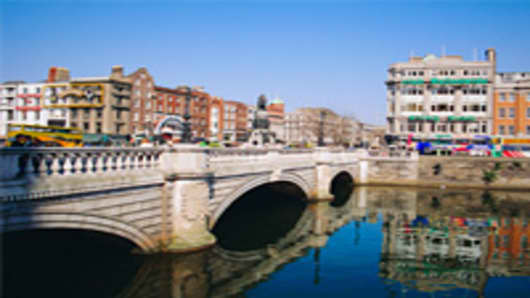Patrick Honohan, Ireland’s central bank governor, on Wednesday put a “For Sale” sign over the country’s ailing banks, stressing that foreign ownership of the troubled sector was “not as far-fetched a scenario as it might appear to some”.
Speaking to Dublin’s International Financial Services Summit, he said: “From a national point of view, the entry of foreign purchasers for some or all of the banks would help transfer both credit and liquidity risk to those in a better position to bear them.”
He went on: “Astute bankers recognize there is profitable banking business to be done in Ireland in the years to come, though they will differ on the optimal timing and the pricing of entry.”
His comments came as Ireland’s cost of borrowing reached a new euro-era high, amid growing speculation among investors that its fiscal and banking crisis will force the country to seek outside assistance, either from the International Monetary Fund or the European Financial Stability Facility, set up by the European Union in the wake of the Greek debt crisis earlier this year.
The bank governor, an academic and former IMF economist, acknowledged wryly “the favorable impact on investor confidence has not yet been as strong as might be hoped for” following three austerity budgets and a €50 billion bank bail-out to restore minimum capital buffers.
But, he expressed disappointment that the “the recapitalization burden is often over-stated as a contributor to the required fiscal adjustment”.
He said the interest cost on the promissory notes issued to the banks as capital amounted to “about one-tenth of the fiscal adjustment now in prospect over the next four years”.
The government has provided €29 billion for the scandal-racked Anglo Irish Bank and the two smaller building societies Irish Nationwide and Educational Building Society – with all three now state owned.
It has also invested €3.5 billion worth of preference shares in each of the two big banks, Bank of Ireland and Allied Irish Banks.
AIB is set to be more than 90 percent government-owned after it concludes a €5.4 billion open offer and placing later this year, which is fully underwritten by the state’s sovereign wealth fund.
Mr Honohan calculated that if losses incurred at the local operations of Lloyds and Royal Bank of Scotland are also included, Ireland’s property crash has resulted in losses across the six main lenders of €85 billion or 55 percent of gross domestic product.
“In addition to the state’s share in injecting funds to meet these estimated losses, the remainder has in effect been absorbed by the shareholders. I mention this... to dispel any impression that the policy and shareholder response in restoring capital levels might have grossly low-balled loss estimates.”


